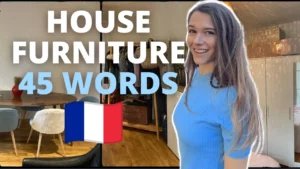Transcript of the video
But most of the time, in French, "on" is equal to "nous".
We use the pronoun "we" instead of using the pronoun "us".
Hi everyone, hope you are doing well.
I'm back today for a new French video.
Today, we're going to look at a tip to help you speak a little more like a native speaker.
If you are new to the channel, I am Elisabeth.
Every week, I offer you videos to help you progress in French and to learn a French that is really spoken in everyday life by the French.
As usual, you have subtitles available in French and English if you need them and especially if you like the video, do not forget to put a like at the end.
Today, we are going to talk about the pronoun "nous" or rather the pronoun "on", you will see, you will, you will understand very quickly and if you have already heard about the French together, it will be very familiar to you.
When you learn a new language, you learn pronouns.
In French, we learn je, tu, il et elle, nous, vous et ils (and elles).
The different pronouns therefore, to say I am, you are, he or she is, we are, you are, they are.
In French, there is also the pronoun "on".
This is the indefinite pronoun. It is used to refer to everyone and at the same time to a particular person.
The verb used after this pronoun "we" will be conjugated in the third person singular, as with the pronoun "he" or "she".
"We are", for example, if conjugated with the verb to be in the present tense.
Here are two examples. In this street, you can see very old buildings.
In Paris, you can eat macaroons.
You see, we don't represent anyone in particular.
But most of the time, in French, we are equal.
We use the pronoun "we" instead of using the pronoun us.
"We" then represents the collective, it represents several people. Mathieu and I are getting married.
When speaking, the French use "on" instead of "nous" almost all the time.
Be careful, because 'we' is not conjugated like we are, as we have seen before, it is conjugated in the third person singular.
It may seem very strange to you because, as I told you, we use "we" to talk about several people, to talk about a group of people and we conjugate the verb that follows it in the singular.
This may sound very strange.
For example, I can say that my friend Vanessa and I really like this restaurant.
It may sound strange, but that's how it is.
I think that if "on" is used so often by French speakers, it's because it's much shorter, it's more impactful quickly.
It's quicker to say we really like this restaurant than to say we really like this restaurant. Of course, it's grammatically correct to say we. You can say it at any time. We'll understand you, it's correct.
In this video, I'll give you a tip to speak a little more like a native speaker.
As I was saying, the French are more likely to say we're happy than we are happy, or I'm going to say we're going shopping and not we're going to shop.
Again, you can say we, but it's a matter of daily use.
For example, if someone asks a friend and I did you like that restaurant?
I'll more instinctively answer yes, we really loved the food.
Of course, I could say yes, we really loved the food, but the first formula that will come into my head is we really loved the food.
If one were to make a difference between "we" and "us", in terms of usage, one could say that "we" is a bit more familiar.
When speaking, almost systematically, almost every time, the French will say "on" instead of "nous".
In writing, it's different. We're going to use "we" a little more if we want to make nice sentences.
But if I'm addressing friends, for example on WhatsApp or Instagram, I'm going to say "we" for sure.
Like I said "we" is a little more familiar, but really, it's very light.
For example, at work, I'm going to say let's do the meeting at 3:00, right?
And not we do the meeting at 3pm, right?
When we use "we" in speech, it's really a very sustained language.
We are going to use it in a more formal and even very formal context.
If you see people addressing each other as "we" repeatedly, it may be that they come from high society, that they are, for example, noblemen.
But in everyday life, when we talk to each other, to our friends, to our colleagues, to our family, it is really what we use by reflex.
We have seen that even if "we" represents a group of people, several people, the verb that will follow it will be conjugated in the singular.
On the other hand, be careful, it will seem strange to you, but if after that, we have an adjective or a past participle, it is conjugated as if "we" were plural.
So, if "we" represent women, the adjective will be granted to the feminine plural.
For example, I will say my friend Corinne and I went to the movies, we went to the cinema.
It can seem really strange because we have this "we", after, we have the verb in singular and after, we have the past participle in plural.
But that's the spelling rule.
After saying my friend Corinne and I went to the cinema, I could say we are happy to have seen the last Almodovar.
Happy, es.
Of course, it is the same if it is two men or a man and a woman.
The adjective or the past participle is granted if necessary.
On the other hand, if "on" is used, as we saw at the beginning of the video, as an indefinite pronoun, adjectives and past participles do not agree.
That's it for today.
I hope this little tip will help you.
So remember, in most contexts and conversations, we use the pronoun "on" to designate several people instead of the pronoun "nous".
I hope you enjoyed this video.
If you liked it, put a like and if you are new, subscribe.
And don't forget to activate the bell so you don't miss any video.
I'll see you very, very soon.








